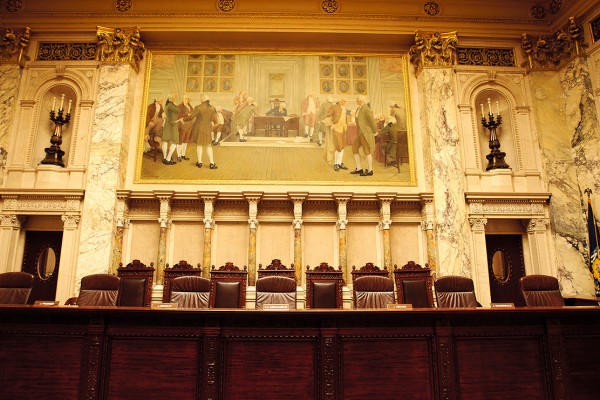Committee votes in favor of chief justice elections
By: Dan Shaw, [email protected]//October 31, 2013//
Committee votes in favor of chief justice elections
By: Dan Shaw, [email protected]//October 31, 2013//

Despite concerns that the move might be “only political” in nature, an Assembly committee on Thursday voted in favor of a measure that would amend Wisconsin’s constitution to require biennial elections of the state’s chief justice.
State Rep. Gary Hebl, D-Sun Prairie, raised objections to the proposal, charging that proponents had failed to produce rationale arguments to support the need for change. He concluded there could only be political motives behind the proposal to end the court’s practice of bestowing the chief justice position on the justice with the longest tenure on the bench.
State Rep. Andre Jacque, R-De Pere, said he supported the measure because he wanted to reduce internal tensions that many think impede the work of the court.
But Hebl claimed the proposal derives from dislike that the Republicans who control the state Legislature hold for Chief Justice Shirley Abrahamson, who is perceived by many to be a liberal.
“It seems to me that the majority, whenever they don’t like somebody in a position of power,” Hebl said, “they do everything they can to reduce that to a position they can gain control of.”
Despite his objections, the Assembly Judiciary Committee voted 5-3 in favor of Assembly Joint Resolution 67, which would amend the state’s constitution to allow the justices to elect a chief justice every two years. Currently, the justice with the most seniority can hold the position as long as he or she is re-elected to 10-year terms.
Many observers consistently divide the court into two blocs: a liberal one led by Abrahamson and Justice Ann Walsh Bradley and a conservative one composed of Justices Pat Roggensack, David Prosser, Michael Gableman and Annette Ziegler. Justice Patrick Crooks is thought to switch between the two sides, depending on the issue at hand.
Although analyses of the court’s opinions have found the supposed split is not so easily defined, many outsiders have blamed the supposed political divide for various public disputes among the justices.
“When you have a division between the titular head and the other justices,” Jacque said, “you have increased division, increased tension.”
The chief justice’s main duties consist of overseeing the administration of the state’s court system and presenting the state Supreme Court’s annual budget to the Legislature.
Jacque said the person in that position also can exercise some influence over the timing of court decisions.
Besides improving relations on the court, Jacque and other Republicans on the judiciary committee argued that bestowing the leadership position on the member who enjoys the support of the majority will make the court run more efficiently.
Because amending the constitution requires a referendum, they said they were giving voters the final say on how the chief justice should be chosen.
Hebl, though, said he doubts Republicans would be going to the trouble of changing the constitution if Abrahamson were not the chief justice and Bradley, because of her having the second-longest tenure, were not in line to take on the position next.
“If we had Chief Justice Gableman,” he said, “you know you would not be here.”
Because of the steps required to amend the state constitution, the soonest the proposed elections could take place would be 2015. In Wisconsin, a constitutional amendment cannot be made without being approved by both houses of the Legislature in two separate Legislative sessions and then approved in a statewide referendum.
Legal News
- State Bar leaders remain deeply divided over special purpose trust
- Former Wisconsin college chancellor fired over porn career is fighting to keep his faculty post
- Pecker says he pledged to be Trump campaign’s ‘eyes and ears’ during 2016 race
- A conservative quest to limit diversity programs gains momentum in states
- Wisconsin prison inmate pleads not guilty to killing cellmate
- Waukesha man sentenced to 30 years for Sex Trafficking
- 12-year-old shot in Milwaukee Wednesday with ‘serious injuries’
- Milwaukee man convicted of laundering proceeds of business email compromise fraud schemes
- Giuliani, Meadows among 18 indicted in Arizona fake electors case
- Some State Bar diversity participants walk away from program
- Wisconsin court issues arrest warrant ‘in error’ for Minocqua Brewing owner
- Iranian nationals charged cyber campaign targeting U.S. Companies
WLJ People
- Power 30 Personal Injury Attorneys – Russell Nicolet
- Power 30 Personal Injury Attorneys – Benjamin Nicolet
- Power 30 Personal Injury Attorneys – Dustin T. Woehl
- Power 30 Personal Injury Attorneys – Katherine Metzger
- Power 30 Personal Injury Attorneys – Joseph Ryan
- Power 30 Personal Injury Attorneys – James M. Ryan
- Power 30 Personal Injury Attorneys – Dana Wachs
- Power 30 Personal Injury Attorneys – Mark L. Thomsen
- Power 30 Personal Injury Attorneys – Matthew Lein
- Power 30 Personal Injury Attorneys – Jeffrey A. Pitman
- Power 30 Personal Injury Attorneys – William Pemberton
- Power 30 Personal Injury Attorneys – Howard S. Sicula











